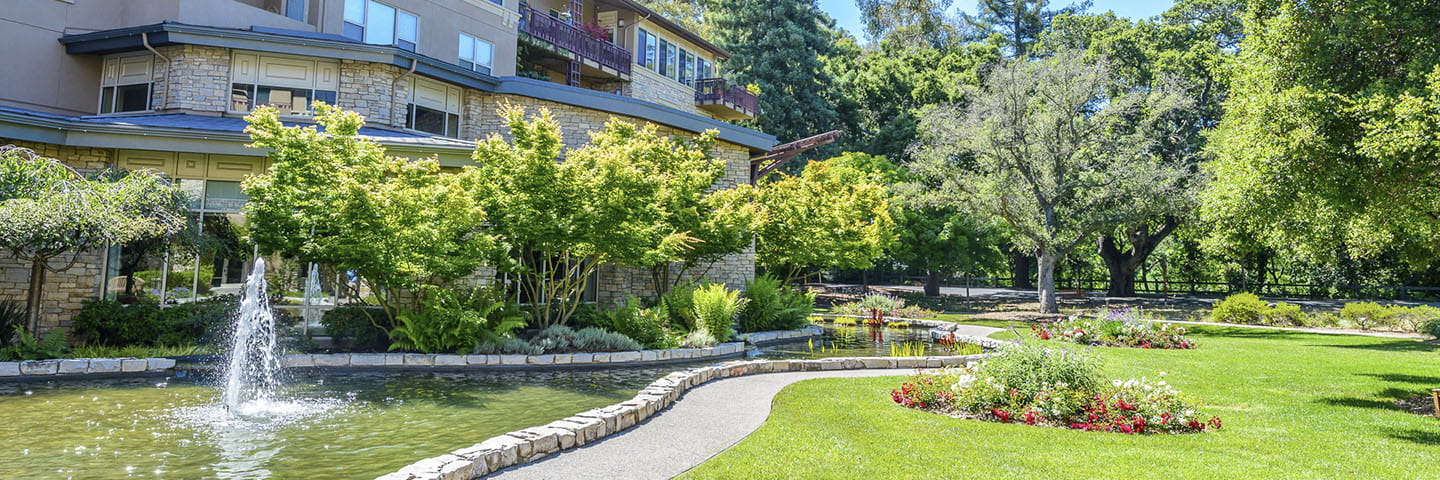
For Vi at Palo Alto resident Amber Henninger, everything in life runs Stanford red. Henninger attended the university from 1951 to 1955 where she earned a degree in psychology, a field she chose in part because of a wonderful introductory course with a professor named Dr. Taylor.
“I’ve always enjoyed people, and pursuing a psych major was a way to try to understand them better,” she said.
Originally from rural Oregon, life at Stanford in upper-class Palo Alto was initially a shift.
“There are more people living here at Vi today than there were in my hometown of Dufur, Oregon,” Henninger said.
Growing up, Henninger’s father worked for the United States Forest Service, building roads through the mountains to help the government access trees it used for lumber during World War II.
On her father’s federal salary, money was tight for the family: “We grew most of our own vegetables, and we had traded our chicken’s eggs for milk from our neighbors,” she said. Educational opportunities in Dufur left much to be desired, too, but Henninger’s parents were adamant that their only child get a great education. Her father had only a high-school education, and her mother was a substitute teacher.
So they sent her to Portland, where she lived with her aunt and attended Ulysses S. Grant High School, Portland’s largest public high school. It was there that she qualified to attend Stanford University.
“I met a lot of criteria for admission: I had good grades, I was also poor, and I was from outside of California,” Henninger said. “Stanford also had a quota of 500 women at that time, and they awarded me a full scholarship — without it, I would not have gone to college.”
Henninger found the adjustment to life at Stanford difficult — Palo Alto was a stark, sophisticated contrast to the poor, rural area where she grew up — and so she proactively sought ways to get involved in the campus community.
“I didn’t feel I fit into the social picture, so I forced myself to find new things to do,” she said.
She became passionate about campus politics, eventually becoming president of Stanford’s Associated Women Students.
While at college, Henninger also met her husband, Larry. They married during her senior year, just before he left for England on an ROTC commission.
Henninger left California the day of her last college final to join Larry in England, where they remained until the summer of 1956. The couple traveled often on the weekends, quickly developing a love for international cultures that would define their activities together later in life.
When the couple returned to the Bay Area, Henninger began her career. She held a variety of jobs, from computer programmer to school career counselor. With each career shift, she pursued further education to be her best in each field: a master’s degree in education, followed later by an MBA, both from Santa Clara University.
“I’m not a scholar; I had reasons for going after those degrees,” she said.
Henninger’s husband, Larry, also earned his MBA at Santa Clara University. After earning that degree, he served as a business consultant to entrepreneurs in the Silicon Valley, and also worked with the Chambre du Commerce de Haute Normandie in Rouen, France.
Following that first taste of international consulting work, the couple became involved with the United States Agency for International Development (USAID) to provide consulting services for fledgling entrepreneurs in Russia in the 1990s.
“In Communist times, you weren’t an entrepreneur — you were part of a greater mass of industry,” Henninger said. “The opportunity to work for themselves, toward goals they set for themselves, was a new concept to these people.“
The couple worked with many small companies in Russia, as well as in Poland and the Czech Republic, and made lasting friends everywhere they went.
Even after a year living abroad and many trips to international destinations, the Henningers remained closely connected to Stanford after their graduation — like many Stanford alumni, including scores of Vi at Palo Alto residents.
Today, Henninger champions the Hoover Institution, a public-policy think tank working to promote economic opportunity and prosperity, as well as national security. She regularly attends programming at the institution, just a short drive from Vi at Palo Alto.
“Hoover attempts to put together reason and informed information. I take great pride in the work they do,” Henninger said. “It’s so important for people to think about things in terms of what they mean in the present, how they’re influenced by what happened in the past, and how they will affect the future.”
In addition to their home in Palo Alto, the Henningers also owned a home in Nevada’s Incline Village, on Lake Tahoe. The couple split their time between the two homes for many years.
But in 2005, when Larry began suffering from cardiac issues, the couple began to seek out a housing alternative that offered care options.
“We wanted to plan our future so that we would not be a burden on our kids,” she said. “We were among the first Stanford alums to move in to Vi at Palo Alto when it opened in 2005,” she said.
She and Larry lived at the community for 10 years before Larry passed away in April 2016.
Today, Henninger says she doesn’t have a laundry list of hobbies she pursues; she loves casually entertaining and being involved with her Stanford community whenever possible.
“I love being so close to many activities where I spend my time — including Stanford football and Stanford basketball,” Henninger said.

